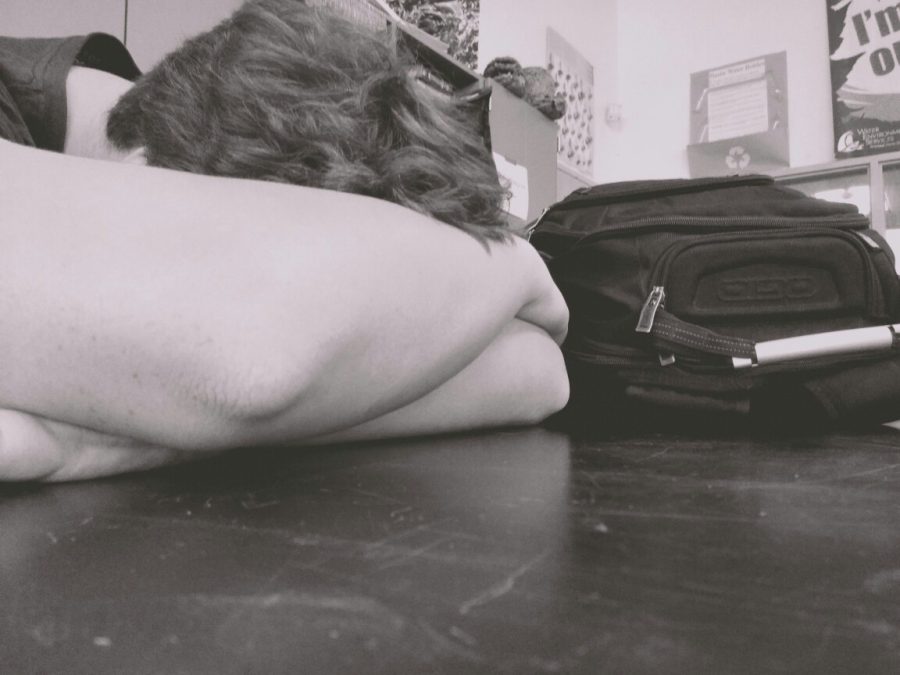Sleeping Through School
Among teens, lack of sleep has became an epidemic. Sleep deprivation has resulted in many teens having an increased rate of very harmful repercussions in their lives as a result of their insufficient amount of sleep. Which can include complications concerning your emotional health, lack of ability to pay attention, and possibly depression just to name a few amount. It appears the consequences of this seemingly trivial choice can heavily affect your long-term well-being throughout your life.
A poll by the National Sleep Foundation from 2006 revealed that more than 87 percent of high school students in the United States get far less than the suggested amount of 8 to 10 hours of sleep every night. As well as the number of hours spent sleeping are beginning to decline in teens. Though studies show adults and teenagers both in many nations are becoming sleep deprived more often, this is also more profound in teens and affects them more heavily, especially developing throughout adolescence. Which has striked some professionals as alarming like Nanci Yuan, a director at the Stanford Children’s Health Sleep Center, who once described this problem of teens and sleeplessness in a report as a health epidemic. So it’s quite evident that this is an issue.
A major problem that can stem from sleeplessness in teenagers is an immense inability to persevere to their peek of effort due to poor concentration as a result of sleeplessness. Sleep is very essential for being something that’s chiefly responsible for the mental and emotional state of our health. Someone may become less reactive in the amygdala, a region in the cerebral hemisphere forming part of the limbic system & is responsible for the brain’s role to process emotion, as well as memory. It’s also important to keep in mind that unhealthily staying awake at certain hours really is dependant on the choice somebody makes to stay up when you really boil it down, though that also isn’t to say that this is solely their own fault. Unenlightenment in the subject of sleep can play a major role in the instance of somebody choosing to stay up for too long.
One interviewee that was gotten ahold of was one parent of an NCHS student named Gill Franklin who does personally experience somewhat of a problem of staying up at unhealthy hours when asked if she personally noticed this in her child. She recommends that not only her child, but pretty much anyone should plan to sleep for 7-8 hours for each night in response to the question of how much sleep she think teens should really be getting. When asked how she feel about this and who’s fault she thinks this is, she responded that this did indeed come off as a disappointment to her, saying that it is obviously the fault of her child. She responded that she believes the problem her child has with this is just a result of a kind of ignorance for the harm it can really cause for them when asked what reason she thinks her child unhealthily stays up for, A somewhat amount of carelessness. Which I’m inclined to agree to. Like it was already said, it seems one major factor that goes into this result of sleeplessness is an unenlightenment in the subject of sleep benefits and outcome of deprivation of sleep. One thing that seems to heavily supports this is that according to a poll done by Gallup taken from the population of the US, “43 percent of people say they would feel better if they got more sleep,”. And that would lead me to believe a large portion of people tend to have the sort of idea that it’s a lot less of a problem than it really is.
The other interviewee was another parent, this time from Washington state, named Gabe Sheck. Who also does notice a bit of trouble their child has with staying awake too often. Gabe feels that some reasons he thinks his child is having trouble in terms of how much sleep he’s been getting is that they have been trying to dedicate more of their time to school, and sometimes spending the night to working, whether it be studying or just generally catching up with their classes. He was asked as a follow-up if he felt that this may be the fault of his own child. Surprisingly though, he disagreed. Saying that this is a result of the apparent complications concerning the health of his child, he suspects that he might very well be an insomniac, which is the reason he says he began buying medication for his child to reduce this issue. I think this is a valid explanation to the question, as I’m sure a lot of people have their own reasons to have to stay up at night even if it is their own responsibility, be it work or maybe some kind of physical disorder involving how they sleep.
To conclude, it does seem that this can result in sometimes serious consequences and may heavily affect many people in their lives. This can be an amount of inability to concentrate, or maybe to better your mental or emotional well-being, especially for the long-term of your life. Which is why I think that this can possibly be a threat to not just teenagers, but among the rest of the public.

